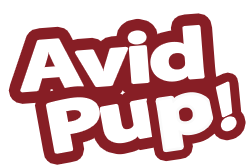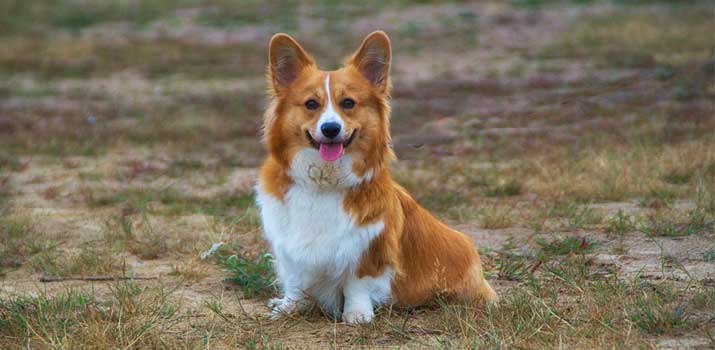
Corgis are a popular breed with a lot to offer families and dog lovers. Spend a few minutes with one, and it’s not hard to see why!
They’re naturally energetic and always love to be the center of attention. What more could you want out a dog?
As a pet parent to a loving Corgi puppy, it’s your job to give your new canine companion everything it needs to stay healthy and happy.
That all starts with a well-balanced and nutritious diet!
Your puppy’s food will play an integral role in its health moving forward. As a result, skimping on quality is out of the question.
Not sure where to start? Here are some of the best dog foods for Corgi puppies that money can buy.
7 of the Best Puppy Foods for Corgis
1. Blue Buffalo Wilderness Puppy Chicken Recipe Grain-Free Dry Dog Food
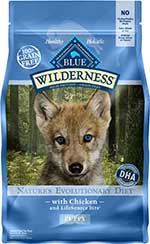
You can’t go wrong with Blue Buffalo’s Wilderness formula.
This one is fine-tuned to the needs of puppies and features wholesome ingredients without any grains.
Deboned chicken is the star of the show and is mainly responsible for the impressive 36 percent protein content. Other meat-based components include fish and chicken meal.
This recipe also contains omega fatty acids and a healthy blend of antioxidants.
The antioxidants come in Blue Buffalo’s LifeSource Bits, which add a punch of flavor and a much-needed kick of vitamins.
2. Nutro Natural Choice Puppy Chicken & Brown Rice Recipe Dry Dog Food
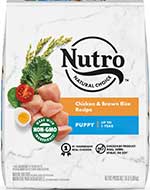
Nutro is another brand that dog owners love!
This puppy-specific product caters to youngsters less than a year old. It has all the usual suspects:
Chicken for protein, fish oil for omega fatty acids, and several vegetables for vitamins. Of course, it has that ideal calcium to phosphorus ratio for proper bone development, too.
This recipe doesn’t contain any unhealthy fillers. Everything is non-GMO and completely healthy.
Thanks to the blend of antioxidants and omega fatty acids, your pup is getting all the biological support they need to thrive.
3. Wellness Small Breed Complete Health Puppy Turkey, Oatmeal & Salmon Meal Recipe Dry Dog Food
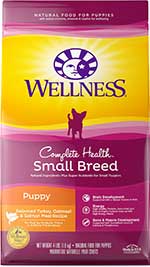
Made for small breed puppies, this product from Wellness has what it takes to bring your Corgi into adulthood.
It offers balanced nutrition that ticks off all the boxes.
The protein content is no less than 28 percent—most of that coming from deboned chicken, chicken meal, and two different kinds of fish meal.
Two things we like about this recipe are the small kibble size and the addition of probiotics.
The tiny morsels make it easier for your gentle Corgi to chew. Meanwhile, the probiotics start your pup’s gut off on the right foot.
4. Royal Canin Small Puppy Dry Dog Food
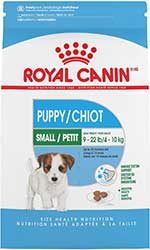
Royal Canin is known for making breed and size-specific recipes.
While this one isn’t exclusively for Corgis, it certainly fits the bill as far as weight and body shape go.
It’s formulated for puppies with a target adult weight of up to 22 pounds. The product supports canines up until the age of ten months.
High digestibility is the priority here. Every ingredient is agreeable, which helps to minimize stomach upsets and digestive issues. It’s a gentle recipe that provides balanced nutrition throughout.
5. Eukanuba Puppy Medium Breed Chicken Formula Dry Dog Food
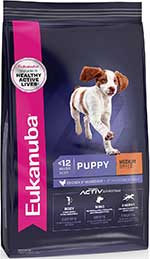
This recipe from Eukanuba is perfect for active Corgis!
It’s a balanced recipe that meets all of your dog’s core needs. Chicken is the primary protein source, contributing to the crude analysis of 29 percent.
Chicken fat and fish oil make up the fats. The fat content is a bit higher at 18 percent, which is excellent for active Corgis that are always on the go.
Eukanuba utilizes the correct ratio of calcium and phosphorus. Together with the protein, these constituents improve bone and muscle health. Meanwhile, the omega fatty acids provide DHA for proper brain development.
Best Wet Canned Dog Food for Corgi Puppies
6. Purina ONE SmartBlend Healthy Puppy Lamb & Long Grain Rice Entree Canned Dog Food
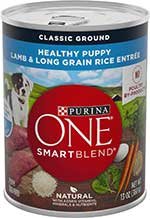
The SmartBlend canned food from Purina One is a meat lover’s dream! Several protein sources support muscle development.
The mash has lamb, chicken, sardines, and a slew of nutrient-rich animal organs.
Of course, vegetables help provide vitamins and minerals. The recipe contains carrots, spinach, and more.
The canned food comes in the form of a meat mash. Look closely, and you can see individual vegetable pieces sitting among the protein base. The texture is soft and easy for young puppies to gobble up.
7. Hill’s Science Diet Puppy Small Paws Savory Chicken & Vegetable Stew Dog Food Tray

Check out this premium stew-like recipe from Hill’s Science. It’s made to resemble your favorite home-cooked meal.
Instead of mashing all of the ingredients into an unidentifiable paste, Hill’s Science kept everything separate.
Entire chunks of chicken, pork liver, carrots, and peas sit in a delectable gravy. The food packs a flavorful punch that can get even the pickiest pooch salivating.
Best of all, it comes in a single-serve tray for easy portioning. Serve it as it is, or use it as a topper with dry kibble. Either way, your Corgi pup should have no problem scarfing it down.
What Makes the Best Dog Food for Corgi Puppies?
There’s no shortage of dog food products on the market today. So, how do you find one that meets your pup’s needs?
Here are some of the most important factors to consider as you shop.
Real Meat Protein
All dogs need a healthy supply of protein to stay healthy. Protein contains amino acids, which are the building blocks of muscles.
Corgi puppies need dog food that has at least 22 percent protein in it. A higher percentage is always welcome, too.
The best types of protein come from wholesome and identifiable animal meats. Steer clear of the mystery meats and vague labeling.
Make sure that the protein is at the top of the ingredients list, indicating the highest concentration.
Some good protein sources include:
- Chicken
- Turkey
- Beef
- Lamb
- Fish
- Bison
- Venison
A combination of meat ingredients is always a plus!
Healthy and Supportive Fats
Contrary to popular belief, not all fats are bad. In fact, Corgi puppies need fat to thrive. According to AAFCO guidelines, puppies need around 10 percent fat.
Not only does it help provide energy and flavor, but the fat supports many biological functions.
Now, not any fat will do. The best type of fat is omega fatty acids like DHA. DHA is a must-have for pups, as it helps with proper brain and eye development.
Other omega fatty acids can support the skin, improve overall cardiovascular health, and even combat canine arthritis later on!
In most dog foods, omega fatty acids come from healthy fats like salmon oil and flaxseed oil.
- Flaxseed Oil
- Fish Oil
- Animal Fat
Fruits and Vegetables
Plant-based ingredients provide your pooch with all the vitamins and minerals they need to thrive. There’s no limit to the types of components a dog food can have here.
Everything from leafy greens to sweet berries is suitable!
The only thing to avoid is unnecessary fillers. Ingredients like corn, wheat, and soy provide no nutritional value whatsoever.
The same goes for simple carbohydrate vegetables like white rice and standard potatoes.
Look for a collection of healthy vegetables that are chock-full of vitamins and minerals. Many dog foods nowadays tout their antioxidant-rich ingredients.
They support your pup’s health in many ways, preventing cell oxidation and fighting free radicals.
Must-Have Minerals
The thing that sets puppy formulas apart from adult ones is the mineral content. Puppies need a healthy ratio of calcium and phosphorus.
Those two minerals are responsible for bone health and development.
An improper balance can lead to growth issues, which only exacerbate the risks of bone and joint problems in the future.
Look for foods that have a calcium to phosphorus ratio between 1.2:1 and 1.4:1.
It also pays to provide foods that have glucosamine and chondroitin. Those supplementary minerals are common in senior-focused recipes, as they help keep the joint cartilage strong.
However, many puppy formulas have them, too. Giving your pup glucosamine and chondroitin early on ensures that they have years of comfortable joints ahead of them!
Ingredients to Avoid
Despite all of the top-notch dog food choices out there, inferior formulas do exist. They often contain unnecessary ingredients your pup doesn’t need.
As we mentioned earlier, fillers like corn, wheat, and soy are a no-go. They don’t offer much and can cause upset stomaches for your Corgi!
We also recommend avoiding artificial colors, flavors, and preservatives. The two former ingredients have no place in dog food.
A high-quality formula should take care of the flavor. As for color, dogs don’t care either way!
Some less-informed dog owners might think that artificial preservatives are unavoidable. However, natural alternatives do exist. They’re far better for your dog and don’t pose the same health risks as chemical options.
Related: Quick & easy food boosters you can add to your dog’s meals to improve their health
How to Feed Your Corgi Puppy
When you bring your young Corgi home for the first time, it’s best to start them on a two-meal plan.
The breeder should have weaned them off their mother’s milk by this point, making the transition far more manageable. You can start them off on wet canned food if the change to commercial food is still new.
Canned food offers many of the same nutritional benefits, but its texture is more palatable to young dogs who don’t have teeth or those struggling to adapt to dry kibble.
Corgis do best when their daily caloric requirements are split into two or three meals. Avoid free-feeding to prevent unplanned weight gain.
How much food do Corgi puppies need? It all depends on their age and weight.
A puppy’s calorie requirements are constantly changing as its body continues to develop. We always recommend working with your vet to get things just right.
Generally, growing puppies need more food than their adult counterparts. They’re more active and require a constant supply of energy to support their changing bodies.
Vets typically recommend scaling the amount of food you provide based on body condition and weight.
Make sure to stick with puppy formulas until your Corgi reaches full maturity!
Switching to adult recipes too soon could have a detrimental effect on their health.
All About Corgi Puppies
Corgis are an instantly recognizable dog breed. A spitz-type canine, it has erect ears, a triangular head shape, and a pointed snout.
These dogs don’t get very big at all. In fact, they’re known for having short and stubby legs. At most, adults reach heights of about 10 to 12 inches at the withers.
As far as weight goes, adults tip the scales at 23 to 28 pounds.
There are two types of Corgis out there. These include the Cardigan Welsh Corgi and the Pembroke Welsh Corgi.
From a physical standpoint, these two varieties are nearly identical.
The main difference between the two is the color. Most are familiar with the Pembroke Welsh Corgi because of its signature golden fur and white accents.
Cardigan Welsh Corgis replace that golden color with a dark brown.
Whatever type of Corgi you end up adopting, expect to bring home a bundle of energy!
Corgis were originally bred as herding dogs. To this day, many cattle farmers employ Corgis to keep livestock under control.
Though, most people know this breed as nothing more than another loving member of the family. Some of the most famous Corgis in the world are admirable companions to Queen Elizabeth II herself!
Potential Health Issues to Look Out For
Unfortunately, all dogs are prone to experiencing health issues at some point. Corgis are no different. While you might have a healthy and active puppy now, problems could creep up as your dog ages.
Many common Corgi conditions are genetic. They’re a product of many years of selective breeding.
While most of them are unavoidable if your dog is predisposed to them, a healthy diet may help manage symptoms.

Corgis can encounter common musculoskeletal issues like hip dysplasia, degenerative myelopathy, and intervertebral disc disease.
These conditions typically rear their ugly heads later in life, so it’s essential to provide all the joint and bone support you can as a puppy. More on that later!
Beyond those health concerns, Corgis are also prone to obesity. They have a healthy appetite and don’t always know when to stop eating.
Sadly, free-feeding often leads to excessive weight gain, which starts a domino effect of complications.
The risk of diabetes goes up along with the likelihood of suffering from joint pain.
Luckily, obesity is something you can directly avoid! It’s all about managing your dog’s intake and planning meals accordingly.
The Wrap Up
The key to raising a healthy Corgi pup is the proper diet. Don’t take any clever marketing at face value.
Analyze those ingredients lists and scrutinize every formula to ensure that you’re giving your Corgi the very best. It’s what they deserve!
Also Read:
- How Many Cups of Dry Dog Food Are in a Pound?
- Best Dog Foods for Chiweenies
- Best Puppy Foods for English Mastiffs
- Soft Dog Food Brands for Older Dogs With Bad Teeth
- Best Dog Foods for Cane Corsos

